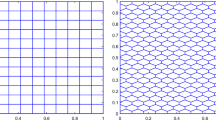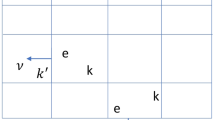Summary.
It is well-known the loss of accuracy when a Runge–Kutta method is used together with the method of lines for the full discretization of an initial boundary value problem. We show that this phenomenon, called order reduction, is caused by wrong boundary values in intermediate stages. With a right choice, the order reduction can be avoided and the optimal order of convergence in time is achieved. We prove this fact for time discretizations of abstract initial boundary value problems based on implicit Runge–Kutta methods. Moreover, we apply these results to the full discretization of parabolic problems by means of Galerkin finite element techniques. We present some numerical examples in order to confirm that the optimal order is actually achieved.
Similar content being viewed by others
Author information
Authors and Affiliations
Additional information
Received July 10, 2000 / Revised version received March 13, 2001 / Published online October 17, 2001
Rights and permissions
About this article
Cite this article
Alonso-Mallo, I. Runge-Kutta methods without order reduction for linear initial boundary value problems. Numer. Math. 91, 577–603 (2002). https://doi.org/10.1007/s002110100332
Issue Date:
DOI: https://doi.org/10.1007/s002110100332




